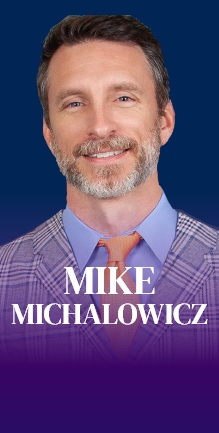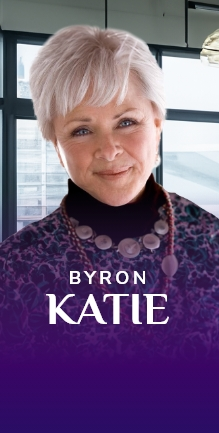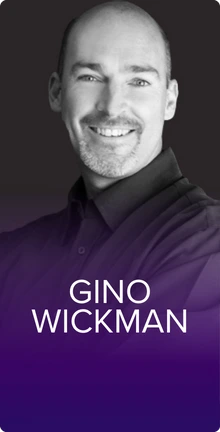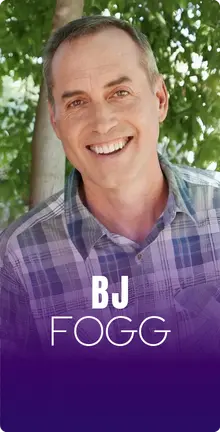Brian, it’s so great to have you on the podcast.
It’s great to be here, Stephan. Good to talk to you.
First of all, let’s talk about the famous formula that has helped so many people. I’m familiar with it but you got to remind me what exactly it is. It’s something about E, and O, and something, but I know it’s important so why don’t you share it with me and my listeners.
The equation is E+R=O. It stands for event plus response equals outcome. The power of it is its simplicity but it’s an endless level of application and scale to help us understand the process and act on the most complex things that we deal with in life. The reality is, for all of us, we don’t control events. The harder reality is that we don’t control outcomes. You and I, and everyone listening, can only control how we respond. Our ability to create the best outcomes in our lives, businesses, and relationships is not determined by the events or circumstances that we are in or we’ll get in the future. But it is, it always has been, and it always will be determined by the quality of our response. That’s ultimately what I hope people build. Quality of responses to create the outcomes they want regardless of the circumstances that they are in.
If our happiness is defined based on the situation, we’re going to be in a really bad place over our lifetime because we’ll just be blown around like a leaf in the wind. Whereas, if our happiness is defined by our internal states that we control, then we can be happy even in adverse circumstances.
Exactly right. At the simplest level, it is, “Can you be happy in traffic or during a delayed flight?” There is not amazing life utility on that unless you travel maybe as much as I do, maybe you do, in which case, a lot of your life is dependent on whether you can stay calm in delayed flights and traffic. But it then scales up to can you choose to be happy and act to be happy maybe during those parts of your job that are necessary but things you don’t want to be doing? Unfortunately, the things that we’re all going to deal with, the tragedy side of life, the deaths that we encounter, the end of relationships that we encounter, the painful stuff in life. We’ve got to prepare ourselves to deal with those just as well as we deal with preparing ourselves for an opportunity.
E+R=O stands for event plus response equals outcome. The reality is, for all of us, we don’t control events. The harder reality is that we don’t control outcomes. You and I, and everyone listening, can only control how we respond. Share on XSo it’s like we need to see the gift in these potentially tragic circumstances that we all get hit with and as my wife, Orion, says, sometimes the bow is on the bottom of that gift.
I love that.
It’s important to recognize that there is an opportunity to learn and grow even in the darkest of times but it can be really hard to remember that when you’re in the middle of it.
It can be. The reason I like E+R=O is that again, it helps me speed up my processing, decision making, and action for the day-to-day things—interacting with my wife, dealing with customers, being on podcasts, writing blogs, all the different things that we do in the day-to-day kind of stuff—and then the bigger decisions—raising kids and all those different things—and then the really heavy stuff. It can scale up or it can scale all the way down and it can be attached to happiness, productivity, money, getting in shape, making better eating decisions. I was listening to your episode with BJ. It’s a huge factor in making choices that if we can learn how to do them efficiently, turn into habits for us. That’s why I really like the equation. It really moves with you with a lot of utility.
How does this equation differ from the A+B=C and A+B+D=E equations from cognitive behavioral therapy? A+B=C is the activating event plus your belief equals C, the consequences that come out of your activating event and your beliefs. If you want to have a better life, you do A+B+D, where you dispute, D is for dispute, that belief system that is kind of automatic, it happens within a split second. And then you can have E, a new kind of experience or effect that is usually much better than if you’re on autopilot with A+B=C. I was familiar with that from cognitive behavioral therapy. I’m curious what your take is on that versus the equation E+R=O.
Very similar. Obviously, cognitive behavioral therapy is one of those things that’s helped a ton of people. My take on it is aligned. I’m not in the therapy space. I’m working with entrepreneurs. I’m working with business people where you mention the word therapy to them and they’re going to run the other direction.
All high performance.
I’m not making it my life’s mission to get people to change their reality of how they view the word therapy but what I did want is I wanted to take the principles from cognitive behavioral therapy. I ultimately think what cognitive behavioral therapy and what I’ve landed on it, we’ve essentially both landed on the same core truth, and that is that the way you process information and the action you decide to engage in, based on how you process the information, has a significant impact on the outcomes and the consequences that you face.
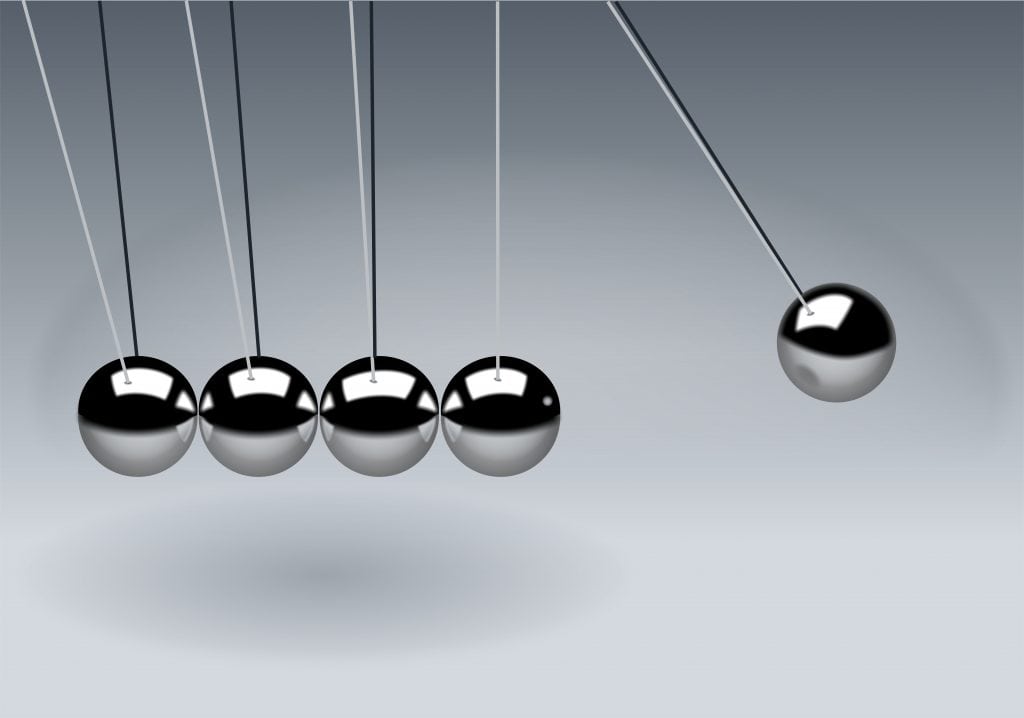
But nonetheless, cognitive behavioral therapy and I have landed on the same thing that Plato landed on thousands of years ago and the Stoics landed on before that, if you believe a bad thing has happened to you, then you have in part been responsible for the creation of the bad thing because the thing that happened was just a thing until you decided that it was a bad thing. That was Seneca, Epictetus, and Marcus Aurelius telling us that, thousands and thousands of years ago from wisdom that they extracted from the world.
I don’t think that I or anybody else has access to any private information, but I do think that, whether it be CBT, or me, or anybody else, there is a truth that exists apart from us in the world and our job is to extract them. Sometimes, there can be two concurrent truths that run at the same time and they can both be true even if they’re somewhat opposing because sometimes what’s true for you just doesn’t work for me and vice-versa.
I think a lot of the stuff that CBT works really well, but here’s the thing. I think you would probably agree with this but disagree if you do, CBT doesn’t work for everybody trying to overcome something. CBT isn’t the exact right approach. Sometimes, E+R=O, for example, while still maintaining its what I would call truthfulness, that’s not the best starting point or tool for somebody maybe working with a deep emotional issue from something bad that happened to them during childhood. There’s maybe a better approach to them. So, I want to make sure that I use the formula E+R=O as an application tool that if you get help from some other part of your life, it really feeds the improving of your response for who you want to be, but it might be a secondary tool in a lot of circumstances in life, not a primary tool.
It’s just what resonates for you and for some, as you say, cognitive behavioral therapy—CBT—might not be appealing because of the therapy aspect of it, for somebody who feels resistance to the concept of getting therapy, but then E+R=O is all about high performance, it’s all about getting more powerful outcome and they’re like, “I’m all in on that.”
If you could share an example of a client, or a friend, or a family member, somebody who’s taken that equation, and applied it, and gotten an amazing outcome, that’ll be great to hear.
Sure. I was just thinking right there. I was thinking about it. I worked on the business side and I work in business at both Fortune 500 andFortune 100 companies. I work with entrepreneurs, sports teams, coaches and athletes. I even work in education. We’re teaching this to teachers and kindergarten through 12th grade, which is awesome. It’s the same core tool of instruction which makes it speaking to do utility.
I was thinking while you’re talking there, whether a salesperson, or a sales leader, or manager in Silicon Valley ever put his people through cognitive behavioral therapy to improve the way they handled customer service calls or sales calls. The answer is probably not. It probably wouldn’t.
That’s what I do. I work with sales teams to say, “Okay,” and I do this with lots of sales teams and entrepreneurs, “Let’s run through what are the events that either are likely to happen over the next one month, or quarter, or year and what are the events that are going to happen. And then, let’s rather than be event-driven and wait until an event happens to reactionary response to it, let’s actually determine what outcome you want independent of events. Then, determine what events you’re going to deal with along the way and let’s prebuild our responses so that when that event happens, we’re still pursuing the ideal outcome.”
The only things you can control is how you respond and your ability to create the best outcomes in your life. Share on XSales is a pretty easy scenario. A lot of salespeople struggle because they don’t have responses prepared for very predictable events that you can anticipate. They might not be predictable in when they’re going to show up or who they’re going to show up from, but they’re predictable that they’re going to show up. Salespeople either get caught blaming the prospect for not being smart enough, or asking a dumb question, or whatever excuses that salespeople make rather than recognizing that that is the exact environment that you need to sell well in. That’s the environment you need to demonstrate value against.
I help sales teams really do two things. One, what are the principles that help govern and guide accessing and engaging in good responses? Those are pretty universal. Then, I work with sales teams or individuals on preplanning and building the skill around specific responses to produce specific outcomes during specific events. If you’re on a call and somebody says, “Boy, where have you seen this work?” Like you were talking with BJ and we’re trying to improve habits, for example, and somebody says, “Well, how do you guarantee that if I build these habits, that I get what I want?” It would help to have that response already nailed down and identified before somebody asks you that question so that when you inevitably know somebody asks you that question, you’ll have a solid response that accelerates you forward into the value creation or the value proof, moves you forward and helps you build a nice relationship with that person.
Examples of this range from I was working with an accounting firm, one of the big 4 accounting firms, there was a junior person, it wasn’t a partner, there were a couple of levels below a partner, was working with the CFO and the CFO’s teams. The accounting firm team made a mistake that cost their client, this company, $250,000. It was a $250,000 mistake that they made. I mean it’s a big one. The CFO called the accounting team in with this junior person who was running this team and ripped their ass in front of everybody. I mean tore them up and down. Style-wise, whether you want to be that person, their call, but deservedly, they were angry. This junior person, rather than get defensive, rather than say, “Why would you talk to me like this?” rather than doing those things, said, “You’re absolutely right. This was my fault. This was my team’s responsibility and I missed it. Had I been on top of it, I would never have let this happen. Give me 24 hours and I will come back to you with why we had this happen and what we suggest from here forward.”
He came back 24 hours later to that CFO, did a bunch of research, found out why the problem existed, took full responsibility for it, explained exactly how it happened and why that junior person was responsible for ensuring that it didn’t, covered for his team, and then said, “In the midst of that process, I actually uncovered something really unique about your business,” pointed it out to the CFO and sold $450,000 of work on top of the $250,000 he had just lost to the client making net $200,000 for his firm.
Nice. That’s great.
The CFO was like, “Hold on a second.” He called him back the next day and said, “I was really hard on you the day before. You’re a younger person, most other people would have wilted under that pressure and folded. Not only did you take it, but you also solved it and were really solid. You didn’t flinch and I just spent a lot more money with you after you made a massive mistake. How do you do that? Was that just a natural talent?” He said, “No. We’re trained on how to do this. We’re trained and we call it E+R=O. I’m trained on how to handle situations just like that as a person.” The CFO said, “Wait, did you say E+R=O?” He said, “Yeah. That’s what my son’s football coach teaches him on how to play football in high school, to handle the fourth quarter and how to handle being in tough circumstances as a football player during practice.”
The CFO and this junior accountant had their shared moment where the CFO’s son was being taught how to do it as a 16-year-old playing football in high school and the senior manager was doing it directly with his guy in hundreds of thousands of dollars of deals. It was a really cool moment for those two guys. That’s an example of how it works.
People talk about life is long and E+R=O, it takes a lot of responses to build a life that you want. Not one, it takes a lot. Hundreds, thousands and thousands over a long period of time. The hard part about life is that it’s so damn daily. You have to do it over, and over, and over again. I want people to be good at that. I want to be good at that.
However, there are so many moments in life where your response in a very short window of time changes your path. If you’re not ready, prepared, trained, skilled, the necessary responses and skills, especially during uncertainty, those moments in life and in business are going to show up and you’re going to find yourself unprepared.
That’s what I want to help people avoid. Having moments show up requiring responses that you’re unprepared for. I want to make sure everyone’s prepared for the events and opportunities coming in their life.
You don’t want the worst version of you showing up because you just let you reactive self take the helm, right?
It’s your default self compared to your disciplined self. The two versions of you. The disciplined you or the default you. I know what the best version of me is right now and it’s the disciplined me. The default me is a good person but it’s not the best me and I don’t have an interest in that person.

It can be really challenging when you feel like you’re being attacked, you’re perhaps being insulted and you get reactive so you take it personally. Let’s say in the sales environment, you get a prospect telling you that your breath smells, unfortunately. What do you do in that situation if you’re not prepared for that without taking it personally and just getting all defensive, angry, snarky, or nasty? You not only lose the sale, you lose credibility and I don’t know, there is like a spiritual loss to you. You go negative in your spiritual bank account by getting all reactive in that way.
What you do is you ask them for gum or a mint and if they have it, you say, “Thank you. Now, we can move on.” If they say no, then you say, “I guess we were both unprepared for this meeting then.” That’s what I would do.
Here’s the first standard that I teach people about life and your response. Default versus discipline in your response. You can draw a very clear line. I like to visualize the equation and picture E+R=O. It goes from left to right. You’ve got event and then from the event, to the right of that, it says plus and then there’s a line. Above that line, it says disciplined response. Below that line, it says default response. There are two pathways you could potentially take. The same event, a disciplined response takes you down this path and it opens up these options. The default response or responses take you down this path and open up these options.
The most common default response is something that I call BCD. That’s blame, complain, and get defensive. I advocate and push for remove BCD from your life immediately, completely, and forever. No blaming, no complaining, no defensiveness. There are a handful of reasons why I think the best life and the best you don’t BCD. It doesn’t solve problems, it doesn’t achieve goals, and it doesn’t improve relationships.
Is there any day where you are going home and on your way home, in your mind, and in your heart, in your spirit, you are hoping upon a hope that your wife complains to you about all the worst stuff that happened to her that day and just unloads everything bad that she didn’t like about her day and the people that she worked with? Not that she would do that, but is there ever any day where you’re like, “Man, I would really just love to hear a bunch of negative stuff that happened in your day today”?
No, of course not.
No, there is none and yet, how often do people in a relationship go home and the first thing that they do when they get home and somebody says, “How was your day?” and they just unload all the worst shit that happened to them that day.
Or you get some feedback and the first thing you get is defensive or an outcome doesn’t go the way you want and the first thing you do is blame the event. It doesn’t work. I don’t BCD in my life. I think anybody who’s really interested in being the best version of themselves uses time to evaluate, do you want to be a BCD person? Do you want to blame? Do you want to complain? Do you want to get defensive? Does that improve the quality of your life? Does it help you get better outcomes? Does it make the events better around you? Do people enjoy being around that? The answer is it just doesn’t. That’s number one. Just don’t BCD. When you just don’t BCD, what happens is it opens up an opportunity for a whole lot of great stuff to take its place.
We should focus more on the quality of our responses to create the outcomes we want regardless of the circumstances that we are in. Share on XFirst, you got to create the space for something good to get in there. That’s by the removal of BCD. If I’m not complaining or when I’ve got some free time, I’ve got free mental and emotional space to fill it with something of more value than BCD. It could be nothing in stillness. Nothing is better than BCD. Just quiet. Gratitude is better than BCD. Listening to some music is better than BCD. Push-ups are better than BCD. Reading is better than BCD. Taking a walk is better than BCD. I always advocate by starting with the removal of it. Now, you’ve got space. Now, you’ve got an empty cup. What do we want to fill it with, rather than getting defensive?
Take the example that you just said. Somebody tells me, “Hey, B.K., your breath really stinks.” I could get defensive right away, but rather than do that, I would just not. Then I would say, “Well what do I want to fill that with?” Then I would say, “Well, I wonder why my breath stinks and I wonder why this person felt so compelled so as to tell me that directly because most people wouldn’t.” I’ll be like, “This person just did me a big favor because I bet the last 10 people who thought my breath stinks didn’t say anything and they just went and told somebody else how bad my breath stinks. I just learned something about myself at a pretty low cost. I’m going to make sure that I have better mouth care from now on.”
That’s what I would do instead. It just seems to be obvious that, that’s a way better approach than charting back or assigning some character flaw to a person who would dare to say that to me. It just starts with me having this space to think through that and that’s by the removal of BCD.
That’s a great point. Our belief systems really come into play. We’re such meaning-makers, so if somebody says you’ve got bad breath or you have a piece of food in your teeth, you could take that personally, you could get defensive because you feel like that’s a personal affront or you could say to yourself, “That was really helpful information. I don’t want to give a bad impression so this helps me to self-correct.” That enlightened way of looking at it does make a big difference on how you respond and what options that you pull from out of the potential responses.
It does. You used the word right there. You said your belief system. It’s something I’m really on. I’m really big on really digging into beliefs and maybe in a way different than what other people have heard before because, at my heart, I am an operator, I’m a doer. While I love the thinking side of life, I also understand that in today’s world because of the amount of media that exists, it’s easier to get caught thinking, reading, processing, watching, and not doing. Equating watching great videos and reading great books with actually being great at doing what you read about.
Looking at a belief system is to understand what’s the purpose of a belief and a belief system, and how do we practically look at a belief system. I’m really fond of asking people, “What’s the purpose of a belief? Why would we even talk about this? What is the function of a belief in your life and my life?” I believe that the function of a belief is to produce behavior. For this reason, what is a belief worth that never shows up in your action? What’s that worth?
Interesting. You’re saying that the belief has a purpose to inspire, or create a behavior, or a pattern of behaviors and if you have a belief that doesn’t create some sort of outcome in that regard, some sort of behavior, then it’s just doing nothing.
It’s hollow and empty. I only read old books. Are you familiar with the Lindy Effect? You ever heard of that phrase before?
I have heard of it. I don’t remember what it means.
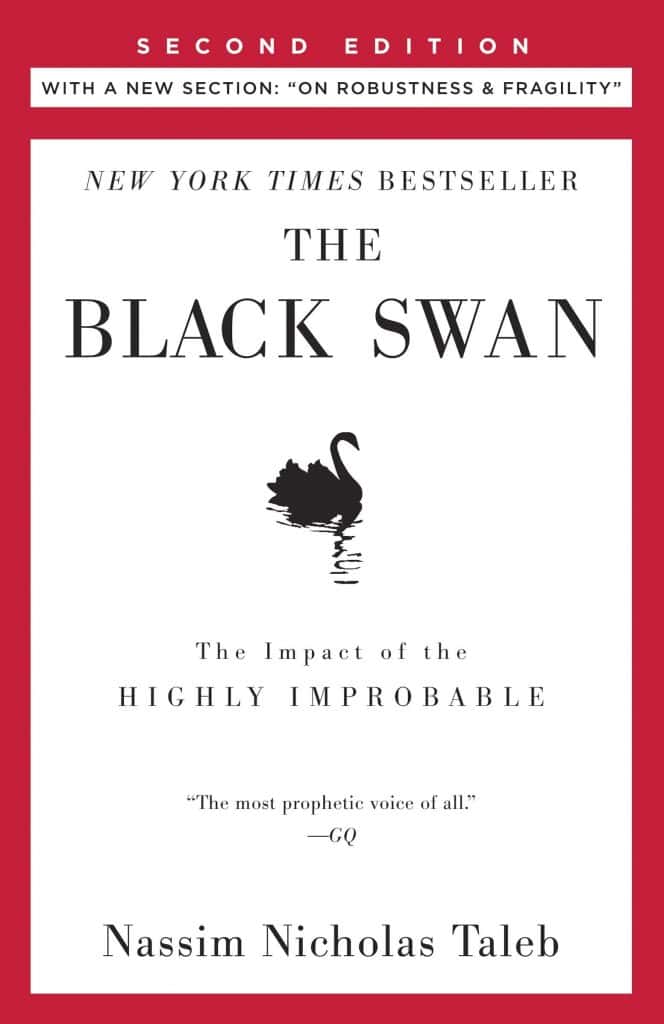
It’s Nassim Taleb who wrote Black Swan and Antifragile. Antifragile had a greater impact on me than any other book that I’ve read. He got popularized the Lindy Effect within the Antifragile book. The Lindy Effect is this. The reliability and value of something grows in direct proportion to the length of time that it has around.
Things that have been around for 20 years can be relied on to exist for another 20 years. Things that have been around for two years can be relied on to be around for another two years. Things that have been around for 1000 years can be relied on to be around for how long? Another 1000 years.
Where it came from is it came from I think a deli in New York called Lindy’s where people found out that they discussed that the length of time you could count on a Broadway play to continue running was the length of time it had already been running. A Broadway play that had been running for 10 years, you could pretty much count on it to run for another 10 years because they have already been through cycles of people at a determined value over a longer period of time.
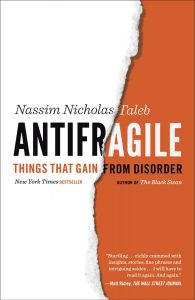
This is happening a lot right now. A book that’s popular for two years, within two years, that book might run out of popularity, run out of prints, and nobody ever reads it anymore. They just caught a little window of time. Whereas a book that’s been in print for 500 years, what does that tell us about the information in the book? It’s been relevant, real, and useful for how long? 500 years. So we can really rely on it, right?
It’s timeless.
Exactly right. I read old books for that reason. If I read a book, say Meditations by Marcus Aurelius, that was written about 2000 something years ago and it continues to be in print to the tune of hundreds of thousands of copies a year all over the world and it’s guided a lot of people because what’s in it has stood the test of time. It has taught things that had been true before our country even existed. It’s been true during difficult times, in the Renaissance, and the enlightenment. It’s been relevant for people in Europe, in Africa, in Asia. What that means for you and me is that what’s in there has been valuable for people for a long time. You can really build a life and a business on this.

The reason I say that is because I’ll read a lot of old things and read a lot of truths from a long time ago from all kinds of different walks of life and they all basically say the same thing. In one form or another, what they say is a person who claims a certain belief but pays no price for it is really only after what they think the claim can earn them and when the pressure to actually live it shows up, they find out that it was really a hollow, empty belief that they didn’t really believe. That’s what pressure in life does to us. It tests our belief systems.
Let’s apply that to BCD. I don’t believe that BCD helps and I really believe that. Meaning, when things get really hard, I don’t BCD. When my relationships get strained, or somebody doesn’t do something that I wish they would’ve done, or I feel underappreciated, or the more human sides of life, I don’t BCD and blame them. I look and I say, “Boy, what’s going on in my relationship where this person feels like this was a way that treating you would’ve been a good option? Why did I leave this person in my life? Why am I so disconnected from this person that they feel attacked in this way by me? Why do I feel a need to get defensive to show them I’m not really that person? Why hadn’t I proved to them I wasn’t this person before this moment arrived? It’s on me to pay a price for the things that I really believe and that is not complaining even if I’m tempted to. Not getting defensive even if I really want somebody to understand something else about me.” I think that’s a good reference point for people.
Again, not for me to tell people what to believe, but instead, just to help people grab a mirror and look at themselves and ask the core question every human being wants to ask. What do I actually believe and how do those beliefs actually show up in my life? Which gives me two options. Raise my behavior to match my beliefs, which plenty of people need to do or lower my stated beliefs to match the behavior that I’m actually willing to engage in my life. Both of those are acts of integrity. Raising your standard of behavior to match the belief you claim or lowering your behavior to match the belief that you actually believe.
Look at a lot of times in life. A life of strain is where your behavior doesn’t match your belief. You have external action and you have an internal tension. That’s problematic for people. That’s where a lot of bad stuff happens in life. Creating that alignment is really key and it can happen by raising or by lowering.
While you’re describing all of this, I’m thinking of a Tony Robbins quote that I really love. It’s something about how there are no true beliefs, only empowering beliefs and disempowering beliefs. You mentioned a belief that you have, which something along the lines of the only books I read are old ones. You also mentioned Antifragile being one of the best books you’ve read and is really impactful, and it’s a new book. It’s not like hundreds of years old or even decades-old so it’s not like that belief is true for you, it’s a guide that helps you to discover old books that oftentimes wouldn’t be in your field of view because you know, that’s a really old book.

For example, a marketer or a copywriter would be remised to discount a book like Scientific Advertising by Claude Hopkins because it was written in the 1920s. That book could change their career, their ability to make a tenfold of income that they’re making now if they just dismiss it because it’s an old book. Or Think and Grow Rich, which was also written in the 1930s, by Napoleon Hill. There are people who to this very day are getting massive incredible outcomes out of reading that really old books. I mean it’s not really old, but it’s pretty old. John Shin, for example, who I had on this podcast.
You’re exactly right.
Do you want to say anything more about that whole empowering versus disempowering beliefs and how that can just be embedded into our consciousness so we’re more selective about the beliefs that we take on?
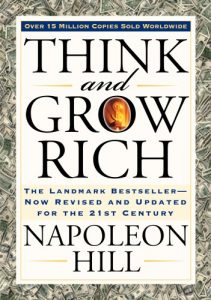
You pointed out a good example. We get into danger at any point in our lives when we start dealing with absolutism. We start dealing with absolutisms and it’s very dangerous. For example, I read copywriting books and there are some new copywriting books that are super helpful and useful.
There is a book I was reading, I forgot the author right now, called Writing Short. I loved it. Now, that’s a technical book, so when it gets into the technical things, there are no old books on a good Instagram strategy. SEO, there is no data is the 1500s SEO. So we’re going to read some new stuff on technical things and at the same time, understanding that your beliefs guide your behavior and then understanding that look, every belief has some form of context that revolves around it and leading into that. I look at hey, does it help me to believe that complaining is a really good option for me? I don’t think it does.
My wife is over here. I’m looking at her. She’s inside the house right now. I can see her through the glass. Does it help me, as a belief, to think that if my wife is in any way critical of me, or gives me feedback, or tells me that I did something to hurt her feelings, does it benefit my relationship, or me as a person, or her view of me to get defensive towards her if she gives me some feedback? I don’t believe it does. I start with that and that guides everything.
From there, it’s a pretty strong belief. The stronger the belief, the more consistent it’s going to show up. If there’s a context that I believe justifies some moving off of it, well then I can move off of it. I’ll read a book like Antifragile or I’ll read some other book that’s new but I’m going to make sure I understand how that squares against my belief system and I’m going to make that a very disciplined choice, not a choice made on autopilot.
Are you familiar with Dr. John Gottman’s The Four Horsemen of the Apocalypse?
I’m familiar with it, but not that familiar with it. Does that make sense?
Yeah. The Four Horsemen are criticism, defensiveness, contempt, and stonewalling. These behaviors that show up in interactions between couples are really big indicators, very predictable indicators of divorce and separation. Dr. Gottman was able to predict with—I don’t know—95%+ accuracy when couples would get divorced, even if it was years later, based on just watching for these micro-expressions of criticism, defensiveness, contempt, and stonewalling during the course of a few-minute video of some interaction. It could be as innocuous of a conversation about the weather. They have these tells of contempt and so forth that just will be fleeting as a micro-expression for a fraction of a second. Dr. Gottman can see that and say, “Oh, this marriage isn’t going to last.” Pretty interesting.

I’d be interested in actually learning more about that because I do think that is one of the interesting pieces about, say, relationships or the response in general. Let’s look at default. I’ve been teaching this and working with people on this for 15 years. One of the more common observations that I have and then end up discussing with people in some pretty deep and emotional way is the temptation of the default side of us is to think that we can get away with it for a while or that anyone responds it isn’t really that big of a deal.
What I’m hearing there is reflective of my observation in a marriage or a relationship. I don’t want to limit it to a marriage, but a relationship of some kind. Have you ever heard anybody or heard from somebody who said, “You know what? One day, I just sat down and I decided that I was going to start mistreating my partner, responding poorly to them all the time, and just show them disgust on my face because I wanted to go into autopilot in this romantic relationship of mine”? Have you ever heard somebody articulate that before? That they sat down and wrote it down on paper?
Of course not.
No, but almost every single time that happens in a relationship, it happens unconsciously to people. It happens like all autopilot forms where all of a sudden, we look up and the relationship has drifted. I mean what do people say when they get divorced? Half the time, what do they say happens? They say we just what apart? “We just drifted.” What is that? That’s a bunch of little actions. A look, a comment, a BCD here, a BCD there, that we think we’re going to get away with because it’s what? It’s just one response. It’s just one comment at dinner. It was just one night. But then, it slowly starts to add up and every response is making a part of your life.
That’s what I think about when I hear that, is what he’s identifying or the little things that end up actually becoming the responses we engage in consistently over time. I don’t so much think that they become habits but it’s that they become our actual lives. They become actually us. It’s really hard to get that level of self-awareness. I mean it’s really hard that’s why I love conversations like these and presenting people with tools.
I try to drive three things. I think life and quality of life are really made up of three things. That is self-awareness, self-discipline, and self-confidence. Do you know yourself? Can you control yourself? And do you believe in yourself? If you lock those three things down and get good systems in place for knowing yourself, controlling yourself, and believing in yourself, you are going to build a great life and if you’re in the business world, you’re going to build a great business. If you’re at home, you’re going to build a great family. Not perfect, but you’re going to build a great one for yourselves.
Even better if you can be aware of your awareness. That’s pretty meta, but if you’re aware of your awareness, then you’re that observer looking down from above, kind of like the out-of-body experience that some people have when they’re going to pass but then they end up getting revived. It’s like you get to see who you are is not just your actions, behaviors, beliefs, thoughts, feelings, and so forth, but that you have those things that don’t make up who you are, it is the things that you are exhibiting. It’s pretty cool.
Actually, I’ll do exactly that. One of the skills of E+R=O is to press pause before you respond. The people here press pause and they think, “Oh, take a bunch of time.” Sometimes, take a bunch of time, but life being what it is, I want you to be able to press pause as quickly as possible to get to a good response. A split second is sometimes all you need. The cool part about being a human is that we can think a lot of stuff in a very short period of time and we can process a ton of info visually, in words, and images in our head in a brief moment.
I’ll press pause and I will mentally leave my body and visually look down on myself in the situation that I’m in, I will run a scenario of response in the moment as a third party downward-looking observer, and I’ll have a self-created out-of-body experience. Not a weird kind but a very strategic kind where I picture myself engaging in a couple of different responses as options in a particular moment. I’ll think through a couple of pieces. I’ll go through who I want to be in that moment. I’ll think through what I could possibly do at that moment to create value or create what I want. I’ll maybe even run through a couple of mistakes or risks that I would want to avoid at that moment. I can do all of that in like two seconds. It’s super strange. That’s what makes it weird. You can do all of that, if you’re training yourself, in two seconds.
I’ll have an out-of-body experience, look down on myself, and be aware of my awareness, and then I’ll step back in and boom! I’ll act. Sometimes, I can do that in two seconds if it’s a somewhat familiar scenario and a trained skill for me and if it’s a super uncertain scenario and a non-trained skill, it takes me longer like it would anybody. But in both scenarios, I find a lot of value in getting out of myself, and mentally, visually looking down on me, deciding who I want to be, and what do I want to do to produce what’s important to me, the people around me, and create value. That’s a good way to do it.
That’s so powerful. I’m sure that all the times that you have done it makes you much more skilled and masterful at it. It’s like the old adage, practice makes perfect, but in actuality, it’s practice makes permanent as Tony Robbins said. It’s like you have that embedded in your muscle memory now so you can do it so quickly. It’s great.
If you believe a terrible thing has happened to you, then you have, in part, been responsible for its creation. Because anything can only be negative if you make it so. Share on XIt’s a value having systems and simple ones at that. I’m a big believer in applying the simplest possible systems into our lives so that we can use them with not just skill, but with speed because I’m competitive and from a competitive nature, it’s not always who can respond the best. It’s the combination of who can respond the best, the fastest as well.
Again, whatever your definition of success is, sales, if you’re going to respond better and faster, you know you can sometimes avoid an entire disagreement or argument because you can empathize quicker than the next person can. You can de-escalate a situation that maybe if it had gone another five minutes, somebody might have gone past an emotional barrier and the conversation can devolve into an unhealthy place. By being to do it quickly, it saves us from being able to get there. Speed is a big risk manager at some times.
Now, you mentioned that you’re competitive. You have an athletic background, correct?
I do. I played college football.
What was the best learning, or experience, or value that you got out of that experience?
For me, college football was the launching point for my entire career. I think the hard part would be limiting it to one thing and my comments to less than four hours. There are two big ones. One is obviously, the audience can’t see me. If you could see me, you would not think, “Oh, there’s a football player.” That’s not what you would think from a size and physicality perspective. I’m 5 feet 9 inches, I think I weigh 165 pounds right now. I played at 185 pounds. I was the smallest person on the field every time. From a talent perspective, I was not “supposed to be” a football player.
What I learned on the football field was that talent didn’t dictate the most important things in life. Choices did, standards did, intensity did, discipline did. These things that we call intangibles, I saw them as tangible. Not just tangible, super tangible. Some of them came naturally for me and I lean hard into that. Others didn’t and I worked hard to build them. What I learned through that process in the athletic field was that I could gain a huge competitive advantage and have a lot of fun, even if I was losing by building skills beyond my talent. I wanted to use every ounce of talent that I had. I wanted to lean into it. But my success was more dictated by my capacity to build skills beyond and on top of my talent than it ever had to do with what my actual talent naturally was. I learned that there. It has fed me and helped me for the rest of my career.
I say it was the launching point for my career because I always viewed those skills as teachable. I was confused about why people with more talent didn’t do more of the things to add on top of that talent. Why did they just rely on talent? Why did they rely on intelligence, or size, or whatever it was? In our world, it’s all kinds of different stuff, the non-athletic world. Why do people accept the average version of themselves just based on talent? I was not a good student at all but what lit me up was how to build these skills and help people build these skills. It was what launched my whole career.
I tried to start it in athletics, couldn’t get anybody to buy in athletics, or listen to me, or train this in athletics because I just wasn’t good enough at the time and I was young, 22. I don’t think coaches wanted to listen to somebody at that age. It was early for the profession and the business side did a lot more of this kind of training. So, I worked in business for a decade after I failed on the athletic side, to start this and went down the training tracks in training development, leadership development, all those things and attached it in trained doctors, physicians, nurses, surgeons, bankers, accountants, insurance, manufacturing, and tech environments.
After a decade of working in business, I got an athletic client and it was a big one. Ohio State football. I used to work with my dad. I recently lost the company. Three or four months ago, I started my own. We worked with athletics and from there, the athletic side pumped off. It just was a huge launching pad. The very traditional story of a 10-year overnight success in the field that I really wanted to operate a lot in, athletics, but I learned a lot and had a blast, still do have a blast working in an environment that I never thought I would be in. That is the business environment of all these wildly different businesses and operations, learning the value of pursuing responses with discipline, sometimes to produce good surgical outcomes, sometimes to produce good manufacturing outcomes, sometimes to manage risk in very unsafe environments say like power line workers, sometimes to make money in banking and accounting environments, and then in the athletic environment to perform well enough to beat your opponent or perform at your very best and set a personal record.
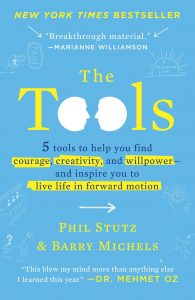
When you were describing the experience of being a football player and how for you, it was about the standards and not about the talent and your physicality, I thought of the first tool in this book called The Tools. Have you heard of that book or read it?
Tools?
The Tools.
No.
That’s a great book. Neil Strauss gave it to a bunch of us at a society intensive that we were a part of and that’s how we met. You must not have been at that particular intensive.
I think so. No.
That book is incredible. There are five tools in that book. These are tools that can really change your life and they were distilled from many years of therapy that these two psychologists, they have become really good in their field, were able to get powerful outcomes for their patients and not just rehash their past and that sort of stuff, just them very quickly to make a huge shift. One of those tools is to visualize the fear that you’re facing as a cloud of dust or something, like this black cloud. The idea here is you run to and through that cloud of fear and just process it to dissipate.
The way that he, with the co-author, came up with this concept and this tool was from a high school friend who was very good at football. He was all-state or something like that. He was really an impressive football player, but he wasn’t the strongest. His physique wasn’t as nearly as impressive as other players and so forth, but what he had was his secret weapon and he shared it with his friend who became this psychologist.
He said the first that he did when he got on the field was he would get tackled as hard and as violently as possible, and then he would be invincible for the rest of the game. He’d run right to the fear. He would go right to the place where he would just get decimated by all these other football players, the opponent, the opposing team, and then he would just be invincible for the rest of the game. You can apply that principle in life as how you’re going to face your fears. Pretty powerful.
I believe in that. I believe in that 100%. I would maybe even go so far as to say that most, if not all, the good things that have happened in my life, that’s what I’ve done and most, if not all, of the things that held me back, or limited me, or hurt me for too long are because I didn’t do that.
Powerful. Did you share both of the things that you got out of that experience of playing college football?
It was two things. The first was that my talent didn’t dictate my future. I can build on top of my talent out of everything. And then, number two was that these were teachable skills that everybody could build, and learn, and grow, and it was the launching point of my career. Those were the things that football did for me.
A life of strain is where your behavior doesn't match your belief. Share on XAwesome. That’s great. I want to go back to something that we talked about early in the conversation and that was the Stoics, Plato, Seneca and so forth. I know that those readings and that wisdom from the past have been very impactful for you. Could you share for our listener who’s not familiar with what stoicism is or who the Stoics were and why it’s important? What do they need to know so that they could maybe get inspired to learn more about it?
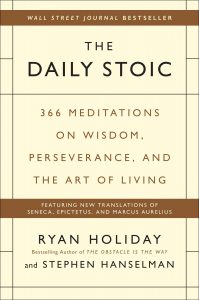
First of all, if you’re super interested in getting more familiar with stoicism, the best person out there converting the Stoics into usable stuff today while also understanding the Stoics themselves is Ryan Holiday and what he’s doing over The Daily Stoic. It’s tremendous. Huge props for what he’s doing with that and bringing it back to modern fashion in a good way without ruining it.
What the Stoics represent and the stoic philosophy is essentially distancing ourselves from the external world dictating our reality, not associating immediate good and bad with anything happening in or around our lives outside of us, and creating our reality from the inside out.
Back to where we started a little bit in the beginning, if you’re sick, or it’s raining, or you lose a sale, that doesn’t make it a bad day. Deciding that those things are bad and then saying, “Oh, that’s a bad day,” that’s what makes it a bad day. Any more than having a lot of money makes it a good life. It doesn’t. Having a lot of money is having a lot of money. It’s somewhat indifferent to whether you have a good life or not. I don’t know everybody who’s got a lot of money but I look around, as I’m sure everybody else does, and having money is not a leading indicator of happiness. It just isn’t. And not having a ton of money isn’t a leading indicator of happiness as well. It’s a mixed bag.
The Stoics are really big on setting internal standards for the man or woman that you want to be and then living as that person through a world that will essentially give you everything. It gives you stuff you like, stuff you don’t like, stuff that triggers happiness, stuff that triggers sadness, stuff that triggers joy, appreciation, and gratitude, and stuff that triggers guilt, shame, and all those different things. It’s not allowing the external to create and trigger those things without us being the decider first.
I think when it gets abused, people become unemotional. I think that’s one of the biggest misreads. We use the phrase when somebody goes through something and they show very little emotion, people use the phrase, “He was very stoic about the whole thing,” because the principle of stoicism is having a certain level of detachment from the external world that allows you to have your own experience of your own creating in the internal world. And so, we associate sometimes stoicism wrongly with the lack of emotion.
Right. With sociopathic tendencies or just lack of empathy, right?
Exactly. Obviously, the stuff we’re reading, we have to do our job. We read the Stoics and they talk about slaves in a lot of Stoic attacks because 2000 years ago, people had slaves. So, we’re not doing a straight one-to-one conversion, we want to pull the principle. Sometimes, the Stoics will go super far and they would talk about if your child dies, a Stoic is unaffected by that. Obviously, that’s a level that I’m neither promoting nor recommending to anybody for whatever it’s worth, but nonetheless, I do believe in the principle of thinking about if that were to happen to me, would my life be over? Because I’ve seen a lot of people, as I’m sure you have, who dealt with tragedy, never thought about it before, and they ended their entire life and went to a very devastating spiral because of one bad thing that happened however tragic it is.
I like stoic principles as a strong guide because they help us not be blown around by external circumstances however good, bad, or indifferent. They help us create meaning from the inside out. The Stoics are really good at that stuff. Now, I think for today’s world especially, you look around, I think stoicism really helps people deal with criticism, which is in spades right now and easier to come at you from a lot further distances than any point in human history. It’s easier to get criticized for less by people you don’t know than ever before because of the media world and the speed of it. Stoicism and studying it can really help you practice how do you have strong beliefs and live them when you know you’re going to get criticized for it. I think our world could benefit from that.
It also helps you recognize that the world doesn’t need you to criticize everybody else. Maybe that politician that you were going to send a really nasty tweet about or a Facebook post about, maybe you don’t need to put that criticism out into the world because you don’t know what’s really going on right there. You saw a video clip that was 90 seconds long and you don’t know 99% of what’s going on in that world. Maybe, it’s better for you to focus on your world and not share opinions about things that you don’t fully understand.
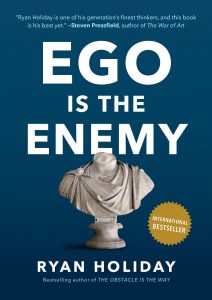
If you focus on the negative, you get more negative. If you focus on the positive, you reveal more light in the world. That’s a very kabbalistic principle. It definitely applies in practical life and that’s what I try and do, and everything that I’m about, whether it’s my podcast, or my consulting, or my interactions with my wife. I’m just trying to reveal light in the world.
You got it. Sometimes, you got to be your own light because what is going on around you, it is kind of dark. It can be or it can just be not the same light as yours and not burning at the same intensity. I think that’s probably the hard part in a relationship. Two people don’t always have the same energy, belief systems, priorities, and needs on things. We want the person that we’ve chosen to be with to match us at all times. It’s just an unreasonable expectation. They won’t be that way for us all the time and we won’t be that for them.
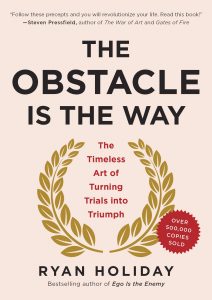
Let’s decide what light we want to give in the world and let’s be that light. When we find the light that matches ours and burns like ours, in those moments when it happens, let’s lean into that. When it doesn’t, let’s continue to be the light that we want to be even if the outside world isn’t giving us the same energy that we would like.
Good advice. Do you have any favorite Ryan Holiday books besides The Daily Stoic? Like Ego Is the Enemy, or The Obstacle Is the Way, or anything like that.
Honestly, everything he’s written is super solid and is a great foundation for somebody to build their life on. I believe in so many of those principles. Ego Is the Enemy, The Obstacle Is the Way. He’s got one coming out soon called Stillness Is the Key. Obviously, I haven’t read it yet, but because I’m familiar with the texts from where he pulls all that stuff and then how he squares those texts as lenses to view the world we live in now, I believe in all of those things. Any of those that you pick up from him would be really solid if you’re interested in learning more about it. He does a great job.
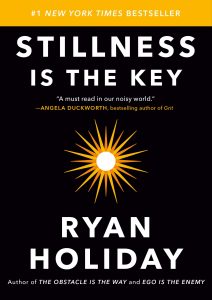
He does. Do you have a book coming out?
I do have a book coming out. I don’t have a date yet, but I do have a book coming out. Right now, the working title is Discipline Is the Shortcut: The Shortest Path Between Where You Are and Where You’d Like To Be Following the Path of Discipline Because Every Other Path Will Take You Longer.
Nice. Well, that’s exciting. I’m going to root for you from the sidelines as you get that book out into the world. I hope it makes as much of a difference as it should. It’s an important message. I’m glad that you’re out there in the world making a difference for folks. It’s important that we step into our greatness and you’ve really done that.
I appreciate that. Like all things, a book is no outcomes guaranteed so we’re going to do our best to have an impact to as many people as possible. Frankly, if anybody other than me reads it, I will be very pleased.
I’m sure you’re going to do amazing with it. Thank you so much, Brian.
Now, listeners, I want you to get something out of this that you’re going to apply in your life. This has been a really inspiring and powerful conversation. This isn’t just for passive edutainment, this is for you to take and apply in your life. Get some new behaviors in place. We’ll hope that you get that in place and send me an email. Let me know what you’ve done with all these great information. If it’s not from this episode, but from another one, I just want to hear from you and let me know if you’re making a difference in the world. My email is **@************er.com.
Thank you again, Brian. Thank you, listeners. This is Stephan Spencer, your host, signing off.
I hope you enjoyed this episode with Brian Kight. If you want to hear more about how to master your mindset, I can’t recommend enough the episode with the huge bestselling author Byron Katie. That’s episode #33.





